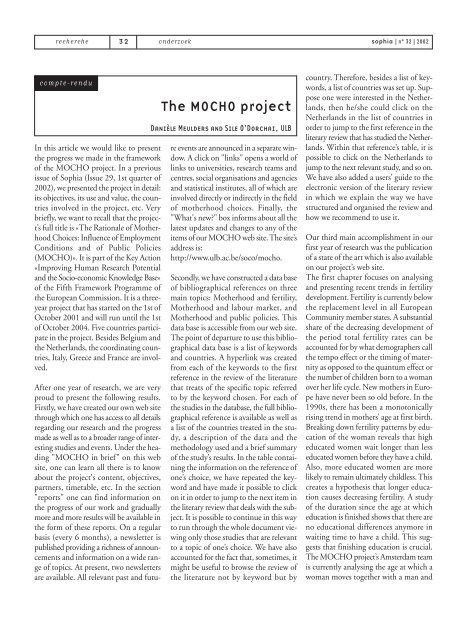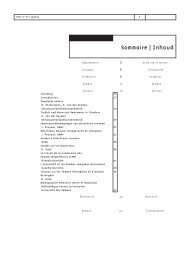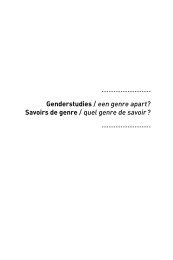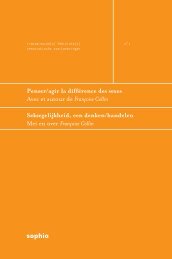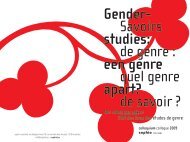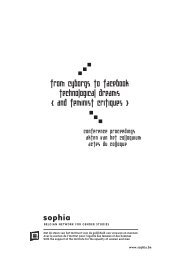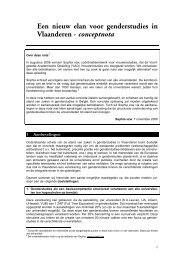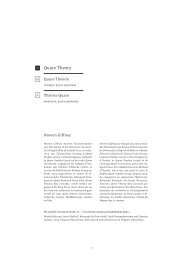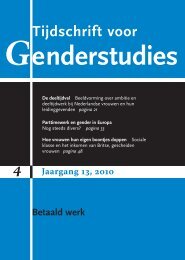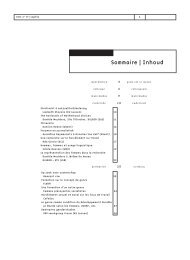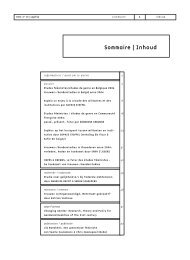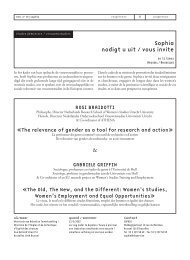Nieuwsbrief 32 (pdf) - Sophia
Nieuwsbrief 32 (pdf) - Sophia
Nieuwsbrief 32 (pdf) - Sophia
You also want an ePaper? Increase the reach of your titles
YUMPU automatically turns print PDFs into web optimized ePapers that Google loves.
echerche<br />
<strong>32</strong><br />
onderzoek<br />
sophia | n° <strong>32</strong> | 2002<br />
compte-rendu<br />
In this article we would like to present<br />
the progress we made in the framework<br />
of the MOCHO project. In a previous<br />
issue of <strong>Sophia</strong> (Issue 29, 1st quarter of<br />
2002), we presented the project in detail:<br />
its objectives, its use and value, the countries<br />
involved in the project, etc. Very<br />
briefly, we want to recall that the project’s<br />
full title is «The Rationale of Motherhood<br />
Choices: Influence of Employment<br />
Conditions and of Public Policies<br />
(MOCHO)». It is part of the Key Action<br />
«Improving Human Research Potential<br />
and the Socio-economic Knowledge Base»<br />
of the Fifth Framework Programme of<br />
the European Commission. It is a threeyear<br />
project that has started on the 1st of<br />
October 2001 and will run until the 1st<br />
of October 2004. Five countries participate<br />
in the project. Besides Belgium and<br />
the Netherlands, the coordinating countries,<br />
Italy, Greece and France are involved.<br />
The MOCHO project<br />
Danièle Meulders and Sile O’Dorchai, ULB<br />
After one year of research, we are very<br />
proud to present the following results.<br />
Firstly, we have created our own web site<br />
through which one has access to all details<br />
regarding our research and the progress<br />
made as well as to a broader range of interesting<br />
studies and events. Under the heading<br />
"MOCHO in brief" on this web<br />
site, one can learn all there is to know<br />
about the project's content, objectives,<br />
partners, timetable, etc. In the section<br />
"reports" one can find information on<br />
the progress of our work and gradually<br />
more and more results will be available in<br />
the form of these reports. On a regular<br />
basis (every 6 months), a newsletter is<br />
published providing a richness of announcements<br />
and information on a wide range<br />
of topics. At present, two newsletters<br />
are available. All relevant past and future<br />
events are announced in a separate window.<br />
A click on "links" opens a world of<br />
links to universities, research teams and<br />
centres, social organisations and agencies<br />
and statistical institutes, all of which are<br />
involved directly or indirectly in the field<br />
of motherhood choices. Finally, the<br />
"What's new?" box informs about all the<br />
latest updates and changes to any of the<br />
items of our MOCHO web site. The site’s<br />
address is:<br />
http://www.ulb.ac.be/soco/mocho.<br />
Secondly, we have constructed a data base<br />
of bibliographical references on three<br />
main topics: Motherhood and fertility,<br />
Motherhood and labour market, and<br />
Motherhood and public policies. This<br />
data base is accessible from our web site.<br />
The point of departure to use this bibliographical<br />
data base is a list of keywords<br />
and countries. A hyperlink was created<br />
from each of the keywords to the first<br />
reference in the review of the literature<br />
that treats of the specific topic referred<br />
to by the keyword chosen. For each of<br />
the studies in the database, the full bibliographical<br />
reference is available as well as<br />
a list of the countries treated in the study,<br />
a description of the data and the<br />
methodology used and a brief summary<br />
of the study’s results. In the table containing<br />
the information on the reference of<br />
one’s choice, we have repeated the keyword<br />
and have made it possible to click<br />
on it in order to jump to the next item in<br />
the literary review that deals with the subject.<br />
It is possible to continue in this way<br />
to run through the whole document viewing<br />
only those studies that are relevant<br />
to a topic of one’s choice. We have also<br />
accounted for the fact that, sometimes, it<br />
might be useful to browse the review of<br />
the literature not by keyword but by<br />
country. Therefore, besides a list of keywords,<br />
a list of countries was set up. Suppose<br />
one were interested in the Netherlands,<br />
then he/she could click on the<br />
Netherlands in the list of countries in<br />
order to jump to the first reference in the<br />
literary review that has studied the Netherlands.<br />
Within that reference’s table, it is<br />
possible to click on the Netherlands to<br />
jump to the next relevant study, and so on.<br />
We have also added a users’ guide to the<br />
electronic version of the literary review<br />
in which we explain the way we have<br />
structured and organised the review and<br />
how we recommend to use it.<br />
Our third main accomplishment in our<br />
first year of research was the publication<br />
of a state of the art which is also available<br />
on our project’s web site.<br />
The first chapter focuses on analysing<br />
and presenting recent trends in fertility<br />
development. Fertility is currently below<br />
the replacement level in all European<br />
Community member states. A substantial<br />
share of the decreasing development of<br />
the period total fertility rates can be<br />
accounted for by what demographers call<br />
the tempo effect or the timing of maternity<br />
as opposed to the quantum effect or<br />
the number of children born to a woman<br />
over her life cycle. New mothers in Europe<br />
have never been so old before. In the<br />
1990s, there has been a monotonically<br />
rising trend in mothers’ age at first birth.<br />
Breaking down fertility patterns by education<br />
of the woman reveals that high<br />
educated women wait longer than less<br />
educated women before they have a child.<br />
Also, more educated women are more<br />
likely to remain ultimately childless. This<br />
creates a hypothesis that longer education<br />
causes decreasing fertility. A study<br />
of the duration since the age at which<br />
education is finished shows that there are<br />
no educational differences anymore in<br />
waiting time to have a child. This suggests<br />
that finishing education is crucial.<br />
The MOCHO project’s Amsterdam team<br />
is currently analysing the age at which a<br />
woman moves together with a man and


